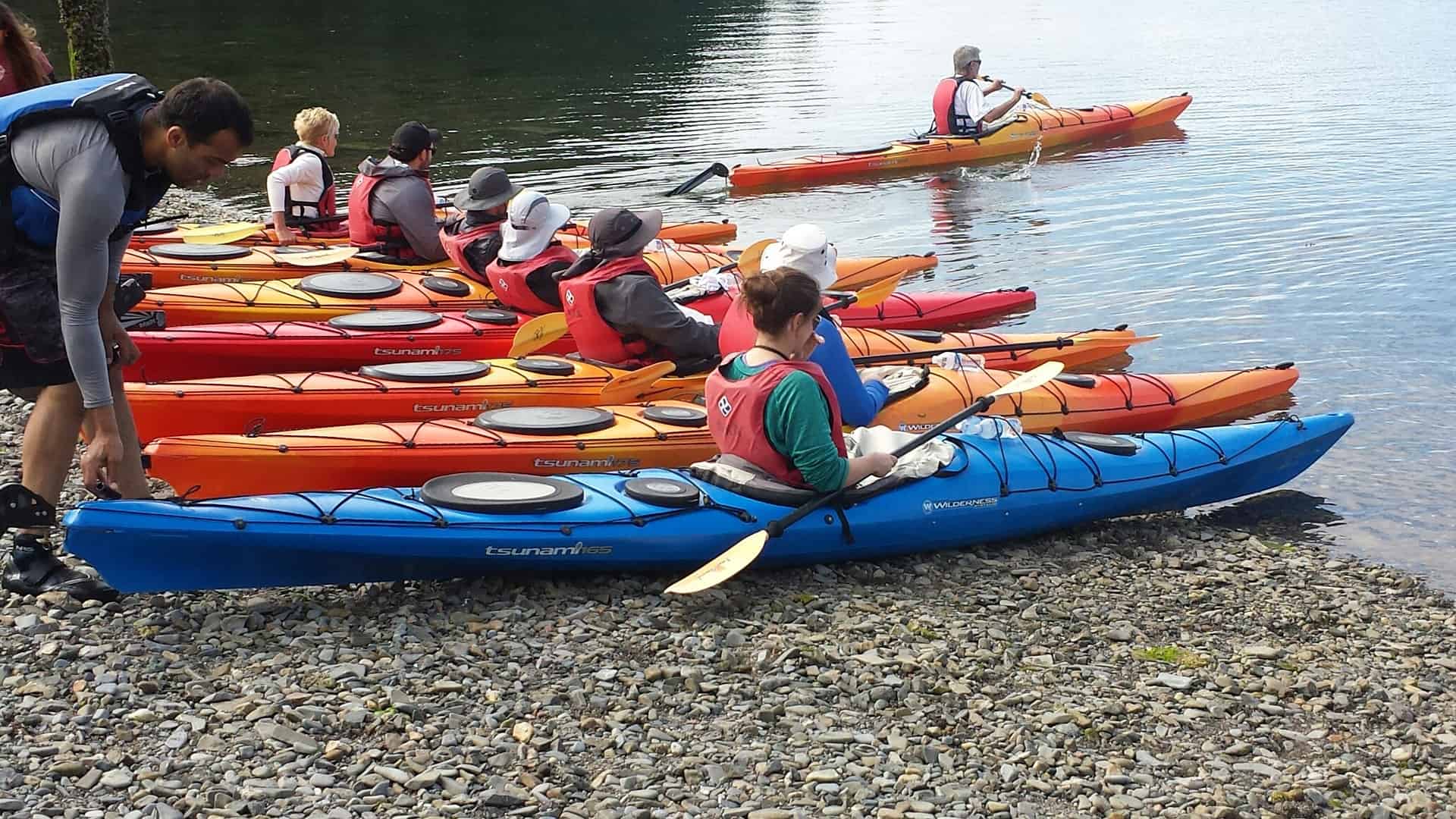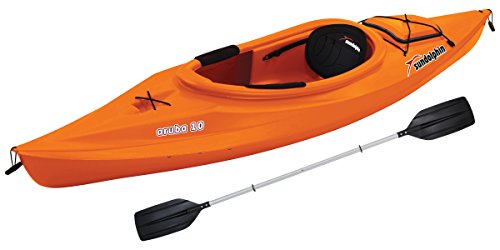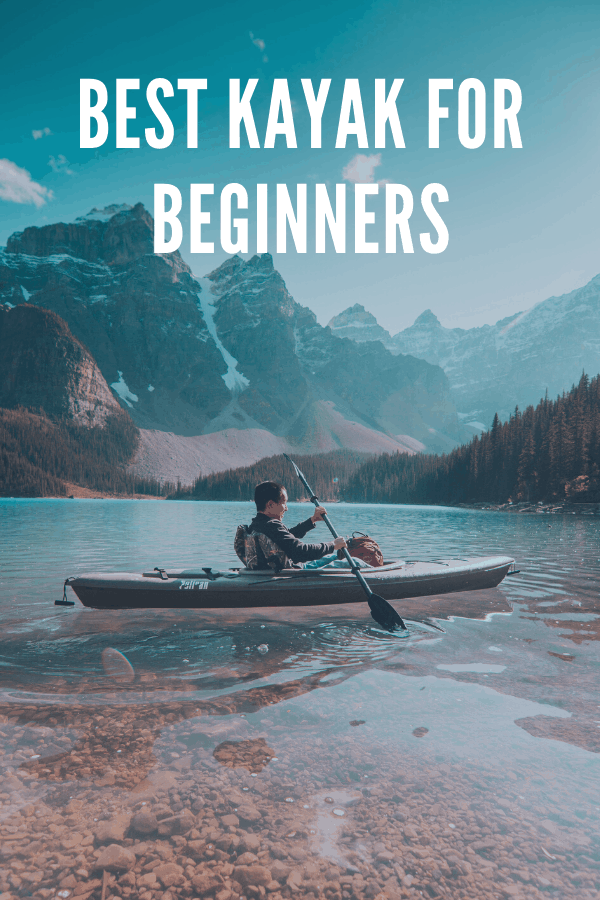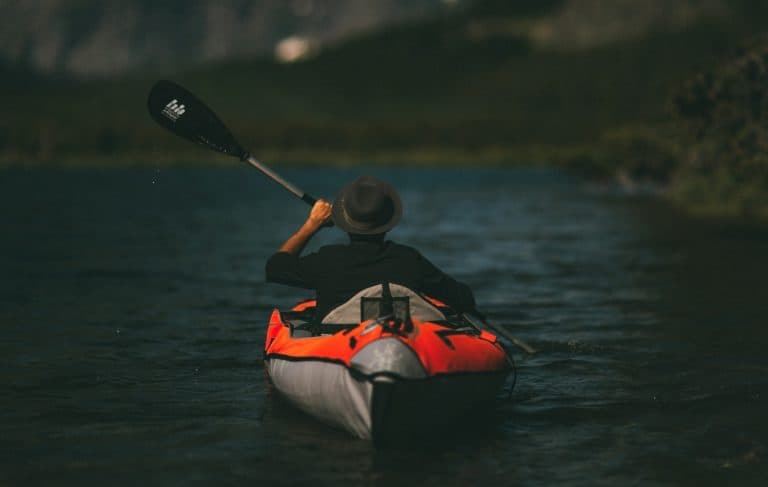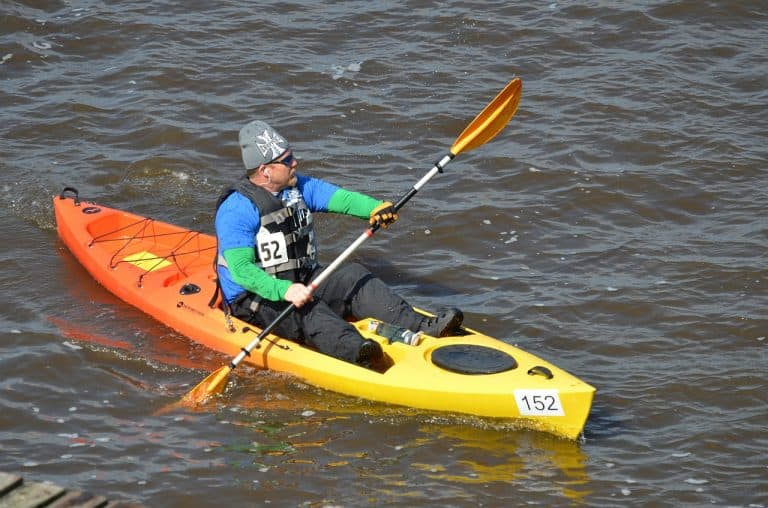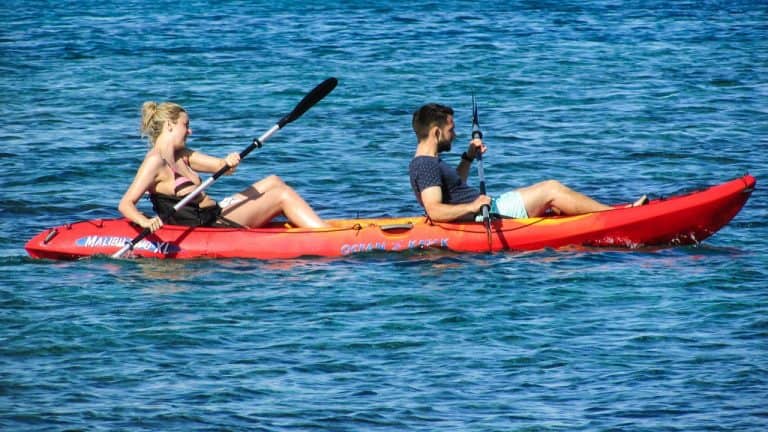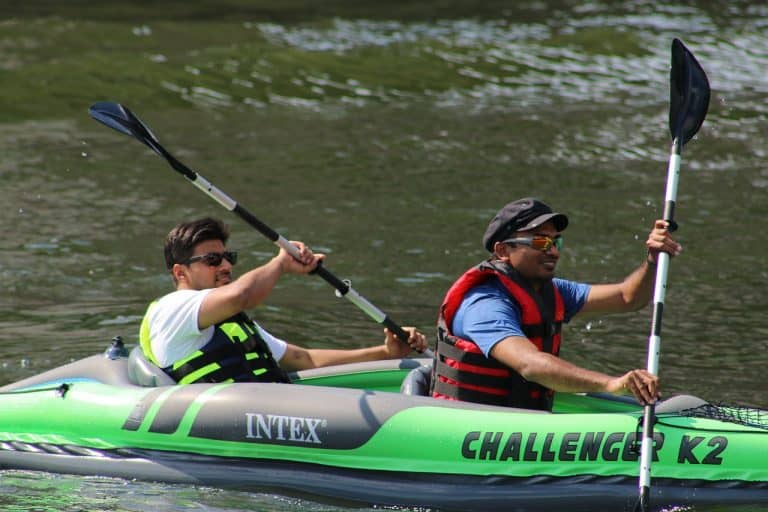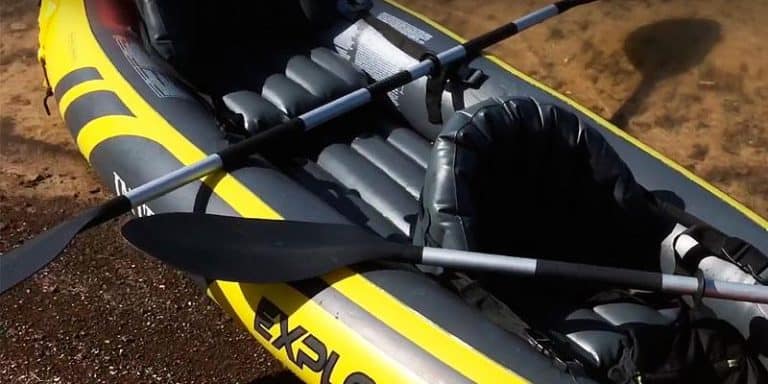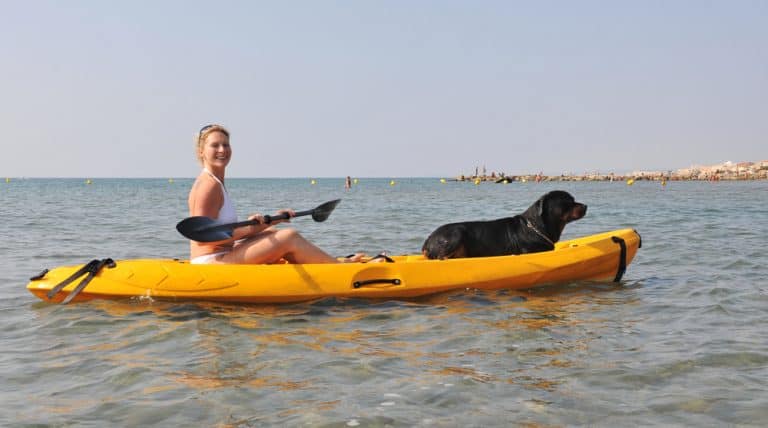Kayaking is an amazing sport and a great way to stay active, meet new people, and experience things you would never otherwise get to see.
When you are a beginner starting out on your kayaking adventure, a lot of the more technical kayaking gear is optional, but one thing definitely isn’t: your kayak!
Picking a kayak can be difficult especially if it’s your first one, but it’s also an exciting process. A good kayak can be with you for many years, so you’ll need to put some thought and planning into exactly what you want from a kayak to ensure you find the one that is right for you.
To help you out, we’ve put together a jargon buster to make some of the terminology a bit clearer, a buying guide to simplify what you should be looking for in a kayak, and reviews of some of the best kayaks for beginners on the market.
Top Picks for the Best Beginner Kayaks
Beginner Kayak Buying Guide
Plan Your Kayaking
The best way to find a kayak that’s right for you is to determine the kind of kayaking you want to do. Most people who are buying a kayak have some experience with kayaking and will have some idea of what kind of kayaking they enjoy.
There’s no point in buying a sea kayak if you are a thousand miles from the coast. Once you’ve figured out what kayaking opportunities are available to you, you can narrow down the types of kayak you are looking at.
What To Consider When Buying A Beginner Kayak
There are a few other things (other than the cost) you might want to consider. Some features that are often overlooked include:
Stability: Stability is an important factor when buying your first kayak. Most first time buyers are only just getting into the sport and it’s important that you buy a kayak that matches your level of experience.
Just because a kayak is stable and easy to paddle does not mean it is slow or boring, it just means it’s less likely to dump you into the water at the first shift of your body weight.
Look for kayaks with good primary stability, this means the kayak should remain stable while you sit in it in a normal kayaking position.
Weight Capacity: Whether you are buying a kayak for the whole family to use or you’re just picking out one for yourself, size matters.
When looking at the weight capacity, make sure you account for a little more weight that the heaviest user. This extra weight can be for camping gear or other equipment.
Cockpit Opening: If you are interested in a kayak with a cockpit opening, like a recreational or touring kayak, the size of the cockpit is also important to consider.
If you are tall, a wider cockpit will make it easier to get in and out of the kayak.
Size of Kayak: While most kayaks are similar in length, a longer kayak tends to glide more smoothly; a shorter kayak is more stable. The width of a kayak determines the stability; the wider the kayak, the more stable it is, which is something to think about as a beginner.
Color:Â The color of your kayak may be more important than you think. A brightly colored kayak will be easier to spot from far away, and this can come in handy if you need assistance.
Storage and Transport: In the excitement of buying your first kayak, it’s easy to forget that you have to both transport and store whatever kayak you’ve bought.
There’s no point buying a 15-foot touring kayak if you have nowhere to store it. You’ll also need to bring your kayak home with you, which can often mean attaching it to your vehicle. You can do this with a specially made kayaking roof rack, or make one yourself by following our guide.

Do I Need Any Special Gear
Another great thing about kayaking is that you don’t need much additional equipment other than a kayak and a paddle. You should strongly consider purchasing a helmet and definitely buy a life jacket.
A helmet should be worn if you are paddling on a river (to protect your head from rocks) and a life preserver will help you stay afloat if you tip. Wear a life jacket even if you think you’re a strong swimmer.
Best Beginner Kayak Reviews
Best Kayak for Kids: Lifetime Youth Wave Kayak
Hull Material: Polyethylene
Hull Type: Sit-on
Length: 6’
Width: 24”
Weight: 18 lbs.
Kayaking is definitely a sport that you can get into at a young age, though most kayaks are designed for adults. The Lifetime Youth Wave is designed specifically with children in mind, ages five and up with adult supervision.
It comes with a host of features that make life easier for a budding young kayaker. To keep the kayak as stable as possible it has an ergonomically designed cockpit to enhance balance, and reversed chines which serve to trap water under the boat, making it hard to capsize.
If your child does end up in the water, a specially designed swim-up step at the rear of the kayak combined with mounded finger grooves for extra grip makes re-entry very easy.
Self-bailing scupper holes will take care of any water they bring in with them. Multiple footrest positions provide comfort for a range of different sized paddlers, while twin fins mounted on the bottom assist in tracking and even surf riding.
At only 6 feet in length and 18 pounds in weight, the Youth Wave is easy to transport and comparatively easy to store. Getting it to the waterline is not a problem and once it’s in the water, it is stable and easy to use.
The only downside to the Youth Wave is that it is primarily designed for use at the beach or at the edge of a lake. If you are looking for a kayak that is suitable for transporting children for longer journeys on rivers or at sea, the safest option is to invest in a tandem kayak.
Pros
- Specifically designed for children
- Multiple footrest positions
- A swim-up step for re-entry
- Self-bailing scupper holes
Cons
- Not suitable for longer journeys or rivers
Summary
The Youth Wave is an ideal way to introduce children to kayaking as it is custom built to allow younger paddlers to use it with ease.
The Wave has a huge range of features, including a swim-up step, reversed chines, and a specially designed cockpit help to keep children safe and comfortable as they learn their ”˜yaking skills.
Best Inflatable Kayak: Intex Challenger K1 Kayak
Hull Material: Polyethylene
Hull Type: Sit-in
Length: 9’
Width: 30”
Weight: 27.2 lbs.
Not everyone has the storage space for a full sized kayak and equally not everyone has the ability to transport a kayak to the water. Luckily, not having those options does not mean you can’t own a kayak. Inflatable kayaks are portable, easy to store, and a super convenient alternative.
The Intex Challenger K1 is a fantastic option for space-conscious paddlers, or for people who just want the convenience of being able to carry your kayak around by hand.
The K1 comes with everything you’ll need to get out on the water in one pack, even an 84-inch aluminum oar, repair patch, and high output manual hand pump. Inflation is an easy process and usually takes less than five minutes.
With a narrow profile, an inflatable I-beam to add stability, and multiple air chambers, the K1 tracks well and picks up speed quickly. Its light weight keeps it maneuverable but does make it somewhat vulnerable to being blown off course by high winds or fast moving currents.
Pros
- Low weight for transportation
- Easy to inflate
- Comes with a paddle and a pump
- Very portable
Cons
- Tracking suffers in high winds
Summary
The main selling point of the Challenger K1 is its utility and easy of use. It packs down to the size of large duffle bag and at 27 pounds is easily person portable.
You don’t need an extra room to store it in or a vehicle to transport it. The K1 lets to carry your kayak around with you and take to the water without having to worry about the logistics.
Best Tandem Kayak: Ocean Kayak Malibu Two 12-foot
Hull Material: Polyethylene
Hull Type: Sit-on
Length: 12’
Width: 34″
Weight: 57 lbs.
Tandem kayaking allows you to share the joy of kayaking with a friend, children, or even your pets. The 12-foot long Ocean Kayak Malibu Two allows you to go one step further, with space for two adults plus one child or pet.
It can also be paddled solo from a central seating position, giving you the option to go at it alone and enjoy all the leg room you could possibly want.
Gear storage for the Malibu is taken care of by its large open cockpit, three molded-in seat wells, and attached gear straps.Two comfort seats and multiple footrest positions allow for the comfortable seating of a range of paddler sizes.
On the water, the length of the Malibu gives it good stability and tracking, but is weight can make it difficult to maneuver if you are paddling alone.
Pros
- Fits two adults and child or pet
- Can be paddled solo
- Multiple footrest positions
Cons
- A little heavy for one-person transportation
Summary
A tandem kayak is a great way to share the joy of kayaking with the people you care about. The Malibu Two gives you the option to take up to one other person and one child or pet.
What makes it stand out is that is can also be paddled solo, meaning you can have, but don’t need, company when you are out on the water.
Best Sit-On Top Kayak: Sun Dolphin Bali SS Kayak 10-foot
Hull Material: Polyethylene
Hull Type: Sit-on
Length: 10’
Width: 30″
Weight: 44 lbs.
The Sun Dolphin Bali is a simple and easy to use sit-on kayak. Its wide beam and multi-chined hull keep it highly stable while a large, comfortable seating area with protective thigh pads and adjustable foot braces keeps the paddler secure and comfortable.
For longer trips, the Bali comes with a large amount of storage with a built-in watertight compartment, paddle holder, and shock cord deck rigging. The Bali also comes with a P.A.C. (Portable Accessory Carrier) which can be removed from the boat and even towed behind the kayak.
This large amount of storage makes the Bali ideal for those looking for a kayak to go camping in. The Bali is more than stable enough to be at home on the river, as long as you don’t plan on running any whitewater, and there is more than enough storage for all the camping gear you might need for an extended trip.
If the Bali has a downside, it is that its wide beam and multi-chined hull makes it a little sluggish when turning.
Pros
- Comes with a Portable Accessory Carrier
- Lots of storage room
- Multiple footrest positions
Cons
- Not particularly maneuverable
Summary
The Bali is ideal if you are looking for a simple, stable, and easy-to-paddle kayak. But where it really shines is when you can take real advantage of its huge amount of storage space.
Kayak camping is the ideal use for this, as there is more than enough room for your tent, stove, and maybe even a drinks cooler.
Best Fishing Kayak: Sun Dolphin Journey SS Fishing Kayak 10-foot
Hull Type: Sit-on
Length: 10’
Width: 30″
Weight: 44 lbs.
The Sun Dolphin Journey uses the same basic hull as the Bali and has many of its positive features, all while adding two flush-mounted rod holders and one swivel rod holder to make it suitable for fishing.
The large, comfortable seating area with protective thigh pads and adjustable foot braces helps to keep the kayak angler comfortable, while the width of the Journey allows for stand-up casting.
The P.A.C. (Portable Accessory Carrier) can double as either a bait holder or can also be used to hold your catch. It can be towed behind the boat while the tankwell it fits into can be used to store more fishing gear.
The only thing that the Journey is missing is the fittings necessary to mount a fish finder without drilling holes in the deck.
Pros
- Has a Portable Accessory Carrier
- Lots of storage for fishing gear
- Multiple footrest positions
- Two flush-mount rod holders and one swivel rod holder
Cons
- Not particularly maneuverable
- No mounting for a fish finder
Summary
The Journey has many of the same benefits as the Bali; it’s stable, easy to paddle, and has a fantastic amount of storage. While only three rod holders might be too few for a veteran angler, they are more than enough for your first fishing kayak, and the lack of a fish finder is only a minor complaint.
Best Sit-In Kayak: Sun Dolphin Aruba Kayak 10-foot
Hull Material: Polyethylene
Hull Type: Sit-in
Length: 10’
Width: 30”
Weight: 40 lbs.
The Sun Dolphin Aruba is a stable and durable kayak with a wide, comfortable cockpit and spacious hull. At 10 feet long and weighing just 40 pounds, it is light enough that one person can attach it to a car rack or get it to the waters edge without too much trouble.
Storage in the Aruba is taken care of by one large rear hatch and bungee cording on the deck for any bulky items.
The adjustable padded seat, adjustable foot braces, and protective thigh pads keep the paddler comfortable on longer journeys and provide the stability for the kayaker to use their lower body to turn the Aruba into tight turns.
The Aruba has a long waterline which helps it pick up speed and track straight, but a low rocker which means it’s not particularly maneuverable.
Pros
- Very stable for beginners
- Lots of storage
- Wide and comfortable
Cons
- Not very maneuverable
Summary
Stable and fast, the Aruba is an excellent choice for a beginner’s first sit-in kayak. The cockpit is wide and comfortable, and the adjustable padded seat, adjustable foot braces, and protective thigh pads help to define the benefits of the sit-in hull by allowing the kayaker to use their lower body to turn the ”˜yak.
Best Touring Kayak: Perception Carolina 12.0 Kayak
Hull Material: Polyethylene
Hull Type: Sit-in
Length: 12’
Width: 26”
Weight: 49 lbs.
The Perception Carolina makes for an excellent first touring kayak for a beginner. It is stable with its soft-chined hull, but its narrow profile and long length give it a good top speed.
The Adjustable Zone DLX seat and leg padding keep you stable in the cockpit and make it comfortable enough for longer journeys. Gear storage is taken care of by two watertight hatches and bungee cord rigging on the outer hull.
The narrow hull of the Carolina lets it cut through rough water, making it suitable for both salt and freshwater kayaking. It has a low rocker which cuts down on its maneuverability, but its longer waterline keeps it tracking straight and moving fast.
The Carolina has a large cockpit which makes entry and exit easier, but can result in water coming in over the sides of the cockpit during rougher weather. This situation can be rectified by the use of a spray skirt.
Pros
- Lots of storage space
- Great stability in rougher waters
- Comfortable seating settings
Cons
- Not particularly maneuverable
Summary
Stable, easy to enter and exit, and capable of handling rough waters, the Carolina is an ideal beginner’s touring or sea kayak. It might not be the most maneuverable boat on the market, but it tracks straight without the need for constant adjustments and has a great top speed.
Jargon Buster
Rocker
The measurement of how much rocker a kayak has indicates how much the kayak’s hull rises at both bow and stern. The more the boat rises at its bow and stern, the less of the hull is in the water and the easier it is to turn the kayak. Kayaks with a high rocker are agile and easy to maneuver, but can have trouble picking up speed and tracking straight.
Tracking
How well a kayak tracks is an indication of how well your kayak will continue to move forward in a straight line. Kayaks with poor tracking tend to slip off this forward line and deviate from the course you want to paddle. This can mean the paddler has to make constant course corrections to keep the kayak traveling straight.
Waterline
A kayaks waterline, sometimes referred to as the load water line, is a measurement of the length of the kayak at the point where the hull meets the water. Kayaks with a longer waterline can achieve higher speeds and often track straighter, but can be difficult to maneuver quickly.
Edging
Edging, also called carving, is a method of turning a kayak by leaning the paddler’s body weight over to one side. This shift in weight puts the kayak “on edge,” allowing it to be pulled into a tight turn using a paddle. How stable the kayak is when put “on edge” depends on how wide the kayak is and what kind of chine its hull has.
Chine
In kayaking, a chine refers to the change in angle in the cross-section of the kayak’s hull. A hard chine indicates a significant change in angle with little rounding, while soft, or multiple, chines give the hull a more rounded shape. Hard-chined hulls are more maneuverable when “on edge,” whereas a soft- chined hull tends to be more stable.
Stability
The stability of a kayak is measured in two stages. Initial stability is how stable the kayak feels when you are sitting in it normally. Secondary stability is a measurement of how stable the kayak feels when you are leaning your weight to one side, to put it “on-edge.”
Skeg/Rudder
Some kayaks come equipped with either a rudder or a skeg, to add to the stability and tracking of the kayak. Rudders are mobile fins attached to the underside of the kayak and are often controlled through the use of pedals. A skeg performs the same function, but in a fixed position. Skegs are often retractable or removable.
How To Choose Your First Kayak?
If you’ve already starting browsing kayaks, you probably notice that are a lot of choices and a variety of types and sizes. First, determine if you want a kayak for yourself or to share with someone else.
Secondly, where will you be using the kayak? Will you be boating around in calm waters or on a body of water with rapids? Will you use your kayak for fishing?
What are the Benefits of Owning a Kayak?
Before you purchase a kayak, you probably want to know, “what’s in it for me?”
Whether you head out on the river or a lake, kayaking is the perfect opportunity to getting outdoors and enjoying nature.
If you are trying to get healthier, kayaking is a low-impact activity that improves your cardio health and strengthens your core. Paddling around in your kayak is also beneficial if you want to reduce stress, clear your mind, relax, and just get away from it all.
Another main benefit of a kayak is that most anyone can use one, even kids, so it’s a great activity for the whole family to enjoy.
Finding Your Perfect Kayak
Buying a kayak is an investment, both in money and in time. Kayak hulls are universally hard-wearing so you might have to live with your choice for years to come.
With that in mind, picking the perfect kayak for you is vital. Before rushing out to buy your first kayak, do a little research into where in your local area you might be kayaking and what types of kayaking you are interested in.
Once you’ve narrowed down the type of kayak you are looking for, be it a touring, fishing, or even tandem kayak, you can follow the steps on our buying guide to find the kayak that’s exactly right for you!
More From KayakHelp:
- Types Of Kayaks
- Best Kayaking Tips For Beginners
- Essential List Of Kayak Safety Equipment
- Beginners Guide To Kayak Terminology
- Is Kayaking Dangerous?

